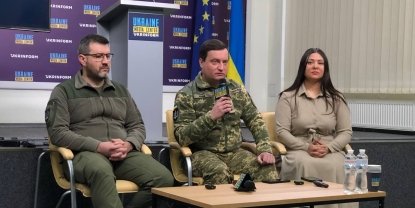The Defence Intelligence of Ukraine (DIU) launched the "I Want to Find" project, within the framework of which relatives of Russian soldiers will be able to search for them, in particular, among prisoners of war.
What is known about the "I Want to Find" project
The Online.ua correspondent reports that the event was attended by the DIU press service representative Andriy Yusov, the speaker of the "I Want to Live" and "I Want to Find" projects Vitalii Matviienko and Irina Krynina, who was the first during the full-scale Russian invasion of Ukraine to come to Ukraine after her captived groom, the occupier named Yevgeny.
Irina also coordinates the "Our Way Out" project, which cooperates with "I Want to Find".
The only search centre for Russian servicemen, "I Want to Find," was created for families of Russians who are ready to search for their relatives and establish connections.
Unlike Ukraine, Russia does not communicate with family members of the occupiers, does not inform about their fate. This applies to all the dead and missing prisoners. There were several cases when Ukraine handed over bodies to the Russian Federation, but relatives did not receive information, Yusov said.
According to him, as part of the project, all residents of Russia will be able to find out all the information about their relatives who were mobilised, from the captured to the dead.
We will provide the information that the Kremlin is hiding from them, Yusov added.
According to Vitalii Matviienko, during the existence of the "I Want to Live" project, Ukraine received more than 30,000 appeals, and more than 300 operations were carried out for the voluntary surrender of Russians.
The search will take place through a specially created chatbot.
We expect that the Russians, who will receive the information, will turn to their authorities to return either the body or to transmit information about the prisoner. In general, demand action from the authorities, Matviienko added.
After the introduction of the "I Want to Live" hotline in September 2022, more than 220 Russian servicemen decided to surrender voluntarily. To date, about a thousand similar applications are still pending.
The Coordination Headquarters for the Treatment of Prisoners of War was established on March 11, 2022. It includes representatives of the Defence Intelligence of Ukraine, the Ministry of Defense of Ukraine, the Armed Forces of Ukraine, the Security Service of Ukraine, the Ministry of Internal Affairs of Ukraine, the National Police and the National Guard, the State Border Service, the Ministry of Justice, and the Ministry of Reintegration.
How do the Russian prisoners of war live in a camp in Ukraine
The Online.ua team spent a day in a Russian POW camp to see for themselves the conditions in which they were kept.
Journalists spoke with several Russian ex-prisoners who signed a contract with the Russian army in exchange for a pardon and came to fight against Ukraine.



